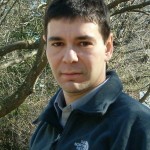 Jacob M. Appel’s first novel, The Man Who Wouldn’t Stand Up, won the 2012 Dundee International Book Award and was published by Cargo; his second novel, The Biology of Luck, was recently released by Elephant Rock. Jacob’s short story collection, Scouting for the Reaper, won the Hudson Prize and is forthcoming from Black Lawrence Press. His short fiction has appeared in more than two hundred leading literary journals including Agni, Alaska Quarterly Review, Colorado Review, Gettysburg Review, Michigan Quarterly Review, Prairie Schooner, Raritan, Shenandoah, Southwest Review, StoryQuarterly, Threepenny Review, Virginia Quarterly Review and West Branch. His prose has won the Boston Review Short Fiction Competition, the William Faulkner-William Wisdom Award for the Short Story, the Dana Award, the Arts & Letters Prize for Fiction, the North American Review’s Kurt Vonnegut Prize, the Missouri Review’s Editor’s Prize, the Sycamore Review’s Wabash Prize, the Briar Cliff Review’s Short Fiction Prize, the Salem College Center for Women Writers’ Reynolds Price Short Fiction Award, the H. E. Francis Prize, the New Millennium Writings Fiction Award on four separate occasions, an Elizabeth George Fellowship and a Sherwood Anderson Foundation Writers Grant. His stories have been short-listed for the O. Henry Award (2001), Best American Short Stories (2007, 2008), Best American Nonrequired Reading (2007, 2008), and the Pushcart Prize anthology (2005, 2006, 2011). Jacob holds a B.A. and an M.A. from Brown, an M.S. in bioethics from the Alden March Bioethics Institute of Albany Medical College, an M.A. and an M.Phil. from Columbia, an M.D. from Columbia University’s College of Physicians and Surgeons, an M.F.A. from N.Y.U. and a J.D. from Harvard Law School.
Jacob M. Appel’s first novel, The Man Who Wouldn’t Stand Up, won the 2012 Dundee International Book Award and was published by Cargo; his second novel, The Biology of Luck, was recently released by Elephant Rock. Jacob’s short story collection, Scouting for the Reaper, won the Hudson Prize and is forthcoming from Black Lawrence Press. His short fiction has appeared in more than two hundred leading literary journals including Agni, Alaska Quarterly Review, Colorado Review, Gettysburg Review, Michigan Quarterly Review, Prairie Schooner, Raritan, Shenandoah, Southwest Review, StoryQuarterly, Threepenny Review, Virginia Quarterly Review and West Branch. His prose has won the Boston Review Short Fiction Competition, the William Faulkner-William Wisdom Award for the Short Story, the Dana Award, the Arts & Letters Prize for Fiction, the North American Review’s Kurt Vonnegut Prize, the Missouri Review’s Editor’s Prize, the Sycamore Review’s Wabash Prize, the Briar Cliff Review’s Short Fiction Prize, the Salem College Center for Women Writers’ Reynolds Price Short Fiction Award, the H. E. Francis Prize, the New Millennium Writings Fiction Award on four separate occasions, an Elizabeth George Fellowship and a Sherwood Anderson Foundation Writers Grant. His stories have been short-listed for the O. Henry Award (2001), Best American Short Stories (2007, 2008), Best American Nonrequired Reading (2007, 2008), and the Pushcart Prize anthology (2005, 2006, 2011). Jacob holds a B.A. and an M.A. from Brown, an M.S. in bioethics from the Alden March Bioethics Institute of Albany Medical College, an M.A. and an M.Phil. from Columbia, an M.D. from Columbia University’s College of Physicians and Surgeons, an M.F.A. from N.Y.U. and a J.D. from Harvard Law School.
Jacob, The Man Who Trounced God at Chess starts a year into Balint’s serial killing spree, but this chapter recounts the circumstances with his wife and Sugarman that initiated his metamorphosis from “conscientious physician to calculating assassin.” What specific timeline does the novel eventually cover? Does it take place over the aforementioned year, or does it continue beyond the time period of the opening narration?
Figuring out how much time the storyline covered was one of the challenges of putting this novel together. I knew that I wanted some narrative distance, but I wasn’t initially certain how much. Eventually, I realized I needed to start in the middle–beginning after Balint has become an assassin, but before his assassination efforts reached a climax.

